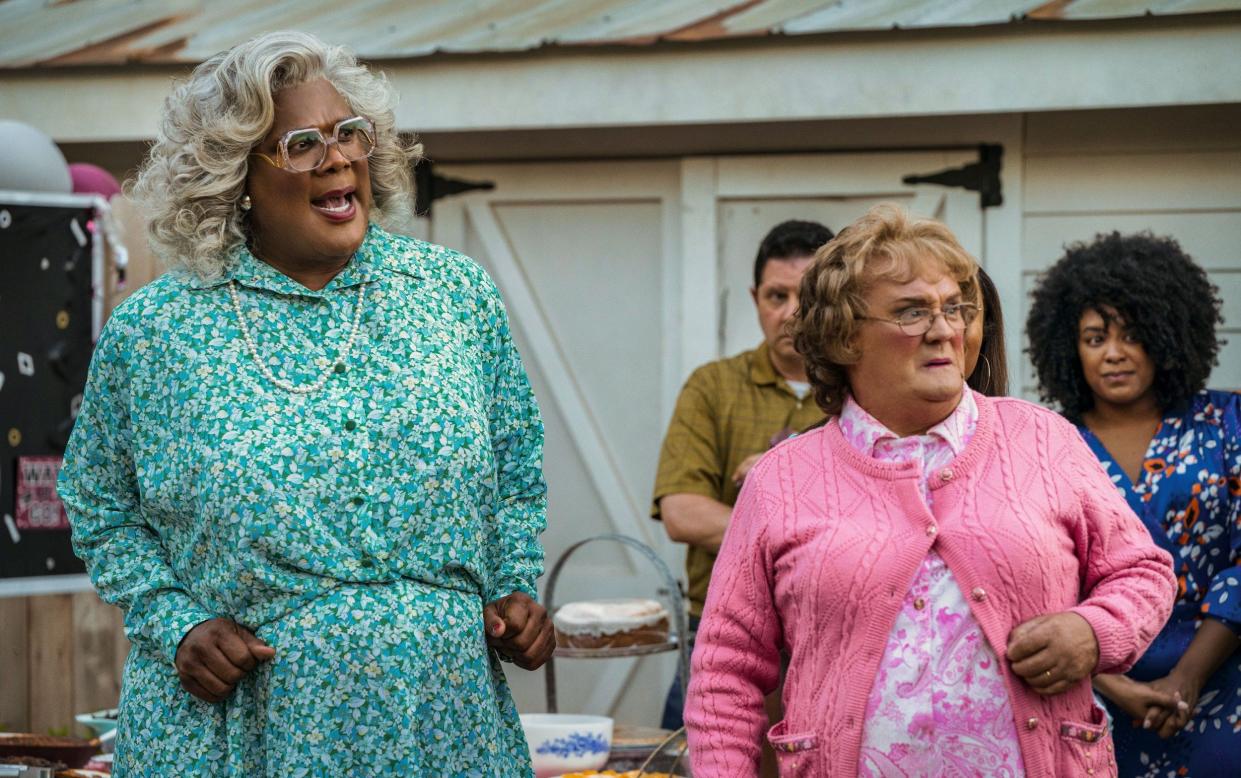A Madea Homecoming, review: Mrs Brown and co annihilate the very concept of comedy

The funny thing about Mrs Brown’s Boys – and I do mean the funny thing, singular – is that the show has an American doppelg?nger of sorts. A few years after Brendan O’Carroll wrote the short radio play that would grow into his demoralisingly popular BBC sitcom, the American actor Tyler Perry composed I Can Do Bad All by Myself – a stage musical that would unleash his own geriatric drag character, Mabel ‘Madea’ Simmons, on an unsuspecting world.
Despite emerging independently on opposite sides of the Atlantic, Agnes Brown and Madea have much in common. Both are no-nonsense working-class battle-axes inspired in part by their creators’ mothers. Both traffic in a distinctive blend of crude jokes and cloying sentimentalism. Both initially connected with their loyal core audience in the theatre: O’Carroll via the numerous Mrs Brown stage shows with which he toured the UK and Ireland for seven years, and Perry on what was until recently known as the “Chitlin’ Circuit”; a string of black-friendly performance venues in the American Midwest. Oh yes – and both are staggeringly, unfalteringly, will-to-live-sappingly unamusing, at least to everyone outside of those since-mushroomed fanbases.
Precisely no one else in the universe will be celebrating the arrival on Netflix this weekend of A Madea Homecoming, which unites Agnes and Madea on screen for the first time. It’s less a film than a compound disaster scenario for comedy: to say I didn’t laugh once is to understate the sheer volume and vehemence of not-laughing I was doing during each of its 106 agonising minutes.
The plot has Mrs Brown (O’Carroll) travelling to the Deep South for her great-nephew Davi’s college graduation ceremony: naturally her unmarried daughter Cathy, played by O’Carroll’s wife Jennifer Gibney, is also along for the ride. Davi (Isha Blaaker) happens to be best friends with Madea’s great-grandson Tim (Brandon Black), which brings the two clans together for a long weekend of mind-numbing culture-clash non-tertainment.
For a sense of the film’s nuanced approach to race-based humour, look no further than O’Carroll’s big entrance scene, in which Mrs Brown arrives at Madea’s doorstep, rings the bell, ostentatiously breaks wind, then (upon seeing her hosts are African American) crosses her arms and shouts the Black Panther catchphrase “Wakanda Forever”. Or the uproar that ensues when Mrs Brown uses the phrase “you just wait one cotton-picking minute”. Or when during an impromptu proposal she turns to the young (again African American) man kneeling beside her and hisses: “This is no time for Black Lives Matter.” Or when she says “knickers”, which Madea and her family mishear as a word we can’t print.
Yet Mrs Brown is very much a supporting character here: there’s less of O’Carroll than you might think, which is good, though that does mean there’s more of Perry, which is not. Where the Mrs Brown-centric scenes are irritating, the Madea ones are by turns rambling and deranged: there are constant, interminable family squabbles with no discernible punchlines, while in a lengthy black and white flashback to the 1950s, we discover Madea was responsible for Rosa Parks’ historic refusal to move from her bus seat, since she was outside the vehicle, threatening the civil rights icon-to-be for stealing her boyfriend.
Other notable quips include Madea’s brother Joe (Perry again) referring to the coronavirus pandemic as “Covid 1920” and Madea repeatedly mixing up Ireland with Iran – a misunderstanding the film threatens to straighten out with a trans-Atlantic sequel: Maybe ‘Mrs Brown and Madea do Europe,’” O’Carroll suggests. “Ooh, I’d love that,” Perry replies. I wouldn’t.
15 cert, 106 min. Dir: Tyler Perry. On Netflix now
